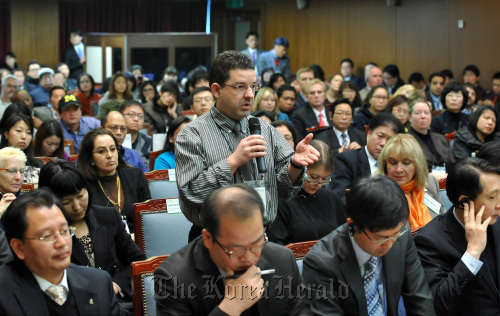Foreign residents and Seoul City officials gathered for an annual town meeting with a common goal of improving their living conveniences in Seoul.
The 2010 Seoul Town Meeting, the eleventh to be held since 2000, was held in the Seoul City Hall Seosomun Annex on Friday under the lead of the Foreign Residents Assistance Division.
Some 180 expats were invited to discuss issues closely related to the living environment, such as transportation, tourism, culture, education and medical services.
Among the topics suggested by the foreign communities and Global Village Center officials, two were selected ― multiculturalism and its implementation in Seoul, and Seoul’s air quality.
The floor was hosted by Alan Timblick, head of the Seoul Global Center and Jasmine Lee, a regular panelist on the television program “Love in Asia.”
“It is due to the contribution of international residents here that Seoul has become a top ten global city,” said Seoul Mayor Oh Se-hoon in his opening speech.
The 2010 Seoul Town Meeting, the eleventh to be held since 2000, was held in the Seoul City Hall Seosomun Annex on Friday under the lead of the Foreign Residents Assistance Division.
Some 180 expats were invited to discuss issues closely related to the living environment, such as transportation, tourism, culture, education and medical services.
Among the topics suggested by the foreign communities and Global Village Center officials, two were selected ― multiculturalism and its implementation in Seoul, and Seoul’s air quality.
The floor was hosted by Alan Timblick, head of the Seoul Global Center and Jasmine Lee, a regular panelist on the television program “Love in Asia.”
“It is due to the contribution of international residents here that Seoul has become a top ten global city,” said Seoul Mayor Oh Se-hoon in his opening speech.

Hong Seok-ki of the Seoul Development Institute, who spoke as panelist in the multiculturalism session, also stated that international residents here should be regarded as Seoulites, not outsiders.
This year, the session floor was given to foreign nationality speakers as well.
“Very often, the differences between local Koreans and foreigners are less conspicuous than those among Koreans themselves,” said Blaz Kriznik, a professor at the University of Seoul.
The citizens’ life in parts of Vietnam is in fact quite similar to that in Garibong-dong, Seoul, he said.
“The disparities are thus rather due to social and economic gaps than ethnic ones,” the professor said.
“Seoulites should thus learn to see beyond the ethnic diversity and embrace the various ranges of their fellow residents.”
Tatiana Primakova, a freelance Russian-Korean translator, suggested that Korean cultural centers should be expanded to incorporate and deliver a wider variety of global cultures.
The second session was opened by Ku A-mi, director of the Green Transportation Policy Division, who presented Seouls efforts and achievements in improving the air quality for the past five years.
During the Q&A and free discussion time, participants asked questions and suggested ideas to improve their life in the city.
The most frequently mentioned issues were traffic safety, education, and smoking regulations.
“Many expats feel threatened by the motorcycles invading the pedestrian sidewalks,” said Michael P. Spavor, deputy chief in marketing in the Seoul Tourism Organization.
He asked how the city could regulate the problem to improve traffic safety, especially for foreigners new to the city.
He also pointed out that taxis, many of them being illicit call vans, can take advantage of tourists and charge excessive fees.
“Many taxis would even refuse to take foreigners as they usually travel a short distance within town,” he said.
“As much as I love and approve of Seoul, I believe that these are the changes which the city should make in order to truly embrace its foreign national residents.”
Some suggested that the frequently used term “foreigner” creates a sense of alienation.
“International residents should be seen as Seoul citizens, and not ‘foreigners’ as they are so often referred to in official documents and the media,” said Yossi Rosenboim, an Israeli resident living here.
Jasmine Lee, who hosted the discussion sessions, evaluated that Seoul has made advancing steps in multiculturalism but has yet to move further.
“I certainly feel the changes and efforts made by Korea over the past years to reach out to its foreign residents,” Lee said.
“The official figures, however, do not fully reflect the reality and the sentiments of the expat communities here, which I hope will improve in the near future.”
Over 1,600 expats from 60 different countries have taken part in the city’s annual town meetings since 2000, according to city officials.
“We hope that the town meeting will act as a venue for expats to make their voices heard and to contribute to Seoul becoming more global,” said Oh Seung-hwan, director of the city’s Foreign Residents Assistance Division.
By Bae Hyun-jung (tellme@heraldcorp.com)








![[Kim Seong-kon] Democracy and the future of South Korea](http://res.heraldm.com/phpwas/restmb_idxmake.php?idx=644&simg=/content/image/2024/04/16/20240416050802_0.jpg&u=)







![[KH Explains] Hyundai's full hybrid edge to pay off amid slow transition to pure EVs](http://res.heraldm.com/phpwas/restmb_idxmake.php?idx=652&simg=/content/image/2024/04/18/20240418050645_0.jpg&u=20240418181020)

![[Today’s K-pop] Zico drops snippet of collaboration with Jennie](http://res.heraldm.com/phpwas/restmb_idxmake.php?idx=642&simg=/content/image/2024/04/18/20240418050702_0.jpg&u=)